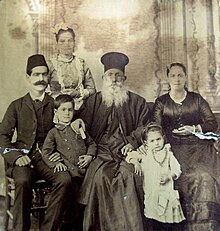Religion in the Middle East
Today, Islam is the region's dominant religion, being adhered to by at least 90% of the population in every Middle Eastern country except for Jewish-majority Israel, religiously diverse Lebanon and Christian-majority Cyprus.
These include the Baháʼí Faith, Druzism,[7] Bábism, Yazidis, Gnosticism, Rastafari, Mandaeism, Manichaiesm, Yarsanism, Samaritanism, Ishikism, Ali-Ilahism,Yazdânism, Sabianism, Shabakism, and Zoroastrianism.
[10] A major source of conflict in the Muslim Middle East is the divisive nature between the two main sects of Islam: Sunni and Shi'a.
[disputed – discuss][citation needed] Although these two sects agree on the fundamentals of Islam and the teachings of the Quran, they are in conflict about who would lead the Muslim community after Muhammad's death.
[22] The Quran, together with hadith (especially those collected in Kutub al-Sittah) and binding juristic consensus, form the basis of all traditional jurisprudence within Sunni Islam.
[citation needed] Sharia rulings are derived from these basic sources, in conjunction with analogical reasoning, consideration of public welfare and juristic discretion, using the principles of jurisprudence developed by the traditional legal schools.
[23][24][25][26] Twelver Shia have their largest populations in the Middle East in Iran (75%),[27][28] Iraq (45%),[29] Bahrain (35-40%), Azerbaijan (75%), Kuwait (15%), Yemen (30%), Syria (12.5%) Lebanon (20%), Saudi Arabia (8%), Oman (6%), UAE (5%), Turkey (12.5%), Qatar (5%).
Members of the 'ummah' who later on became representatives of the Shi'ita branch preferred Abu Bakr over Ali ibn Abi Talib, as the successor of the Prophet and as the rightful rulers of the Muslim community.
[31] Alawis, also rendered as Alawites, Alawīyyah or Nusạyriyya, is a syncretic sect of the Twelver branch of Shia Islam, primarily centered in Syria.
The sect is believed to have been founded by Ibn Nusayr during the 9th century, and fully established as a religion, For this reason, Alawites are sometimes called Nusayris (Arabic: نصيرية Nuṣayrīyyah), although the term has come to be used as a pejorative in the modern era.
[40] Some of the differences that mark Alevis from mainstream Muslims are the use of cemevi halls rather than mosques; worship ceremonies that feature wine, music and dancing, and where both women and men participate; non-observance of the five daily salat prayers and prostrations (they only bow twice in the presence of their spiritual leader), Ramadan, and the Hajj (considering true pilgrimage to be internal one).
[40] Alevis have some links with Twelver Shia Islam (such as importance of the Ahl al-Bayt, the day of Ashura, the Mourning of Muharram, commemorating Karbala), but do not follow taqlid towards a Marja' "source of emulation".
Besides, political turmoil has been and continues to be a major contributor pressing indigenous Near Eastern Christians of various ethnicities towards seeking security and stability outside their homelands.
In Lebanon, under the terms of an informal agreement, known as the National Pact, between the various political and religious communities, the president of the country must be a Maronite Christian.
They have suffered both ethnic and religious persecution over the last few centuries such as the Assyrian genocide and the Simele massacre, leading to many fleeing to the West or congregating in areas in other parts of the Middle East.
The Armenians in the Middle East number around 350,000–400,000[63] and are mostly concentrated in Iran, Lebanon, Cyprus, Syria, Jordan, and Palestine, although well-established communities exist in Iraq, Egypt, Turkey, and other countries of the area.
More Armenian communities reside in Lebanon, Syria, Jordan and to lesser degree in other Middle Eastern countries such as Iraq and Israel.
Smaller Christian groups include; Georgians, Messianic Jews, Russians and others, such as Kurdish, Turcoman, Iranian, Shabak, Azeri, Circassian and Arab converts exist in small numbers.
There are currently several million Christian foreign workers in the Gulf area, mostly from the Philippines, India, Sri Lanka and Indonesia.
In their views not Jerusalem, but Mount Gerizim is regarded as the utmost sacred place chosen by God, where Joshua's alter was and where stones of Law emerged.
[91] The core beliefs of Sikhism, articulated in the Guru Granth Sahib, include faith and meditation in the name of the one creator; divine unity and equality of all humankind; engaging in seva ('selfless service'); striving for justice for the benefit and prosperity of all; and honest conduct and livelihood while living a householder's life.
[95] Sikhism, the fifth-largest organized religion in the world after Islam, Christianity Hinduism, and Buddhism, having over 25 million Sikhs worldwide, has a small presence in the Middle East too[quantify], mainly in the U.A.E, Oman, Bahrain, Kuwait, and Iran.
[97] The Bábí movement signaled a break with Shia Islam, beginning a new religious system with its own unique laws, teachings, and practices.
Yazidis (Yezidi, Ezidi or Ezdi) are an ethno religious group in Iraq, Syria and Turkey, in more recent times, they've also established communities in Russia, Georgia and Armenia after fleeing persecution from the Sunnis during Ottoman era.
[119] Dar al-Ifta al-Misriyyah, the branch of the Egyptian government that issues fatawa (religious edicts), gives lower (if less reliable) numbers, stating that there are 866 atheists in Egypt – "roughly 0.001% of the population"—325 in Morocco, and 32 in Yemen (defined as not only unbelievers, but secularists and "Muslims who convert to other religions").
[123] Devji states there is "a new movement of atheists in countries such as Saudi Arabia ... which takes the form of secret societies", meeting "in internet chat rooms and unnamed physical locations, like the mystics of old".
A small number of engineers, company directors, and managers from Japan, Taiwan, Hong Kong, Singapore, and South Korea have also moved to the Middle East.
The Brotherhood is however unpopular among the majority of Egyptians on account of its fundamentalist views, its clampdown on tourism and its desire to impose Sharia law on the nation.
These Sunni groups often dissent through violence targeted at government, Western or non-Muslims that threat the Muslim nation, Shiites, and sometimes generally directed against moral corruption.
Religion in Yemen is represented by a majority of Islam (including Sunni and Shiite), small numbers of native Jewish communities, Baháʼí, Christian, and Hindu.








